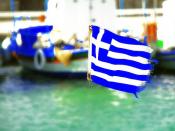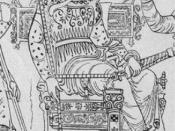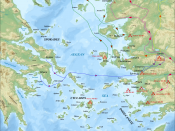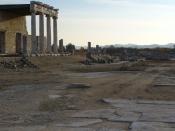Ionian Revolt occurred in 499BCThe Ionian Revolt was the first round in the struggle between Greece and PersiaThe Greeks of Asia Minor revolted against Persian controlGreeks had been subject to Persia since 545BCHerodotus ViewsHerodotus believes the direct cause of the revolt as simply the ambitions and intrigues of the tyrant of Miletus (Aristagoras) and his father-in-law (Histiaeus)Herodotus does not take into account the widespread discontent throughout the Greek cities of Asia Minor which had existed from 545BC when they became subject to PersiaAristagoras of Miletus could not have stirred up a rebellion of disunited Greek communities if they had not already been unhappy with their situationUnderlying CausesThere are many underlying causes of the revolt which Herodotus does not exploreThe Greeks had lost their autonomy and independence in deciding their own lifestyleThe Greeks were subject not only to another power, but an oriental Âbarbarian king to whom they were forced to pay heavy tributeThe heavy tribute the Greeks paid to the king was mostly not returned into local circulationThe Persian system of local government in Asia Minor involved the use of Greek pro-Persian tyrants who were Âpuppets of the great kingThese Greek puppet tyrants held their position through the support of the satrap to whom they were responsibleTyranny had become a common form of government in Greece and Asia Minor when Cyrus conquered those areasIn the generation which followed most states had overthrown their tyrants and tyranny was no longer acceptable to the GreeksIn order to free themselves from tyranny they had to rebel against the Persian king who controlled themThe Greeks needed leadership and direction as they lacked unityDirect CauseHistiaeus (tyrant of Miletus and successful commander under Darius) was summoned to Susa and detained indefinitely by the king who suspected his ambitionsIn Histiaeus place at Miletus he left his son-in-law (Aristagoras)When Aristagoras was approached by a delegation of aristocrats from Naxos (recently removed in a popular uprising and wanting help to recover their position) Aristagoras saw an opportunity to make himself ruler of NaxosAristagoras hoped at the same time to crush Naxos commerciallyAristagoras concealing his purpose made the Naxian exiles an offerAristagoras needed help with his planAristagoras proposed to the satrap at Sardis (Artaphernes) that in returning the Naxian exiles Persia might gain control of NaxosWere they to gain control of Naxos it would be possible to gain control of other islands in the Cyclades and finally extend the great Persian kingÂs empire as far as the rich island of EuboeaArtaphernes submitted the plan to his half-brother Darius and gained his consentThe plan misfiredThe Naxians were warned of the attack and prepared for a long siegeThe costly expedition failed to gain anythingAristagoras was fearful of Artaphernes reaction and was in a dilemma as to what step to take nextAccording to Herodotus Âthese various causes of alarm were already making Aristagoras contemplate rebellionÂHistiaeus sent a message at this time to Aristagoras Âurging him to do precisely what he was thinking of, namely, to revoltÂHistiaeus motive was that he thought Darius would send him down to the coast to restore orderAristagoras Attempt to Gain SupportAristagoras then attempted to gain support from other GreeksHe renounced his own tyranny and urged other Greek leaders to do the sameThose who did not renounce their tyranny were removed forcibly or put under threat of attackAristagoras went to mainland Greece to seek support from Sparta and AthensThe Spartans were not interested when they realised the distance of Susa from the seaAthens and Eretria agreed to send aidAthens contributed twenty warships and Eretria fiveWhy Athens and Eretria Sent Help to IoniaThere were reasons for both Athens and Eretria sending Aristagoras and the Ionians aidThe Athenians were already on bad terms with PersiaThe ex-Persian-tyrant Hippias (according to Herodotus) was moving heaven and earth Âto procure the subjection of Athens to himself and DariusÂThe Athenians had urged Artaphernes (satrap at Sardis) not to listen to the exiled Pisistratid but he demanded that the Athenians take him back or accept the consequencesThe Athenians were now openly hostile to PersiaThe new democracy at Athens was opposed to tyrannyThe Greeks were becoming alarmed at Darius movements into Europe (Thrace) and a revolt may deter themAristagoras also pointed out the close link between Athens and IoniaÂMiletus had been founded by Athenian settlers so it was only natural that the Athenians, powerful as they were, would help her in her needÂThe Eretrians sent help because in a previous was with their neighbour Chalcis they had been helped by Miletus and were now repaying Âa debt of honourÂThe Part Played by Athens and Eretria and its SignificanceÂThe sailing of this fleet was the beginning of trouble not only for Greece but for other peoplesÂThe Athenians and Eretrians landed at Ephesus and were joined by Ionian troops and then marched inlandThey took Sardis (except for the citadel) and in the attack set fire to several thatched housesThe fire spread rapidly until the whole lower town (including the temple of the goddess Cybele) was destroyedThe Ionians, Athenians and Eretrians withdrew to the coast pursued by Persian forcesThey were forced into battles near Ephesus and lost many menThe mainland Greeks sailed home taking no more part in the revoltTheir part in the revolt lead to future trouble for the Athenians and Eretrians who were to suffer at the hands of the Persians in the years to comeReasons for the Ionian DefeatThe Ionians were defeated for a number of reasonsThe Persian Empire had the resources to maintain a sustained war effortThe Ionians also lacked unity and disciplineHerodotus describes their failure to work together under one leader and suggests that the withdrawal of the Samians (who wished to save their houses and temples) encouraged other to Âbecome faint heartedÂResults and their SignificanceMiletus was destroyed, its temples burned and plundered and its inhabitants killed or taken into captivity to SusaMiletus ceased to be a force in history and economic supremacy passed to the mainland of GreeceThe fate of Miletus had a great impact on the Athenians as many felt more help should have been given to IoniaGenerally the Ionians were treated with great tolerance by the PersiansArtaphernes introduced several measures which encouraged peaceIn the following year realising the Greeks hatred of tyranny Darius sent Mardonius to the coast to set up democraciesDespite these improvements the Greeks were still not free (remaining under Persian control until 479BC)The escape of Miltiades as the Phoenician fleet approached and his return to Athens at a critical time was vital for the future defence of Greece at MarathonMiltiades had intimate knowledge of Persian ways and military tacticsThe help given by the Athenians to the Ionians drew upon them the vengeance of Darius who set in motion his first expedition against Greece Bibliography:Ancient Greece (Using Evidence)- Pamela Bradley
More History Term Papers
essays:
Crucial Battles of the Persian Wars
... Ionian revolt provoked the Greeks and the Persians to start what is known as the Persian Wars. With the large pockets of Ionians living in Persia getting more and more discontent, a revolt was imminent. The first thing the revolting Ionians set out to do was to rid the Ionian cities of tyrants ...
Herodotus: Greek Historian
... Persian Kings and Warriors went. Books five through nine consisted of the actual war with Greece, beginning with the Ionian Revolt and ending with Greek victory. Unlike his successor, Thucydides, it is quite obvious that Herodotus ...
Alexander III
... of the leading Greek cities. Philip would give up the Athenian dead. He had 2,000 Athenian prisoners, who would all be released without ransom. He guaranteed not to send troops into Attica or warships to Piraeus. Athens would remain the governmental nucleus of ...





